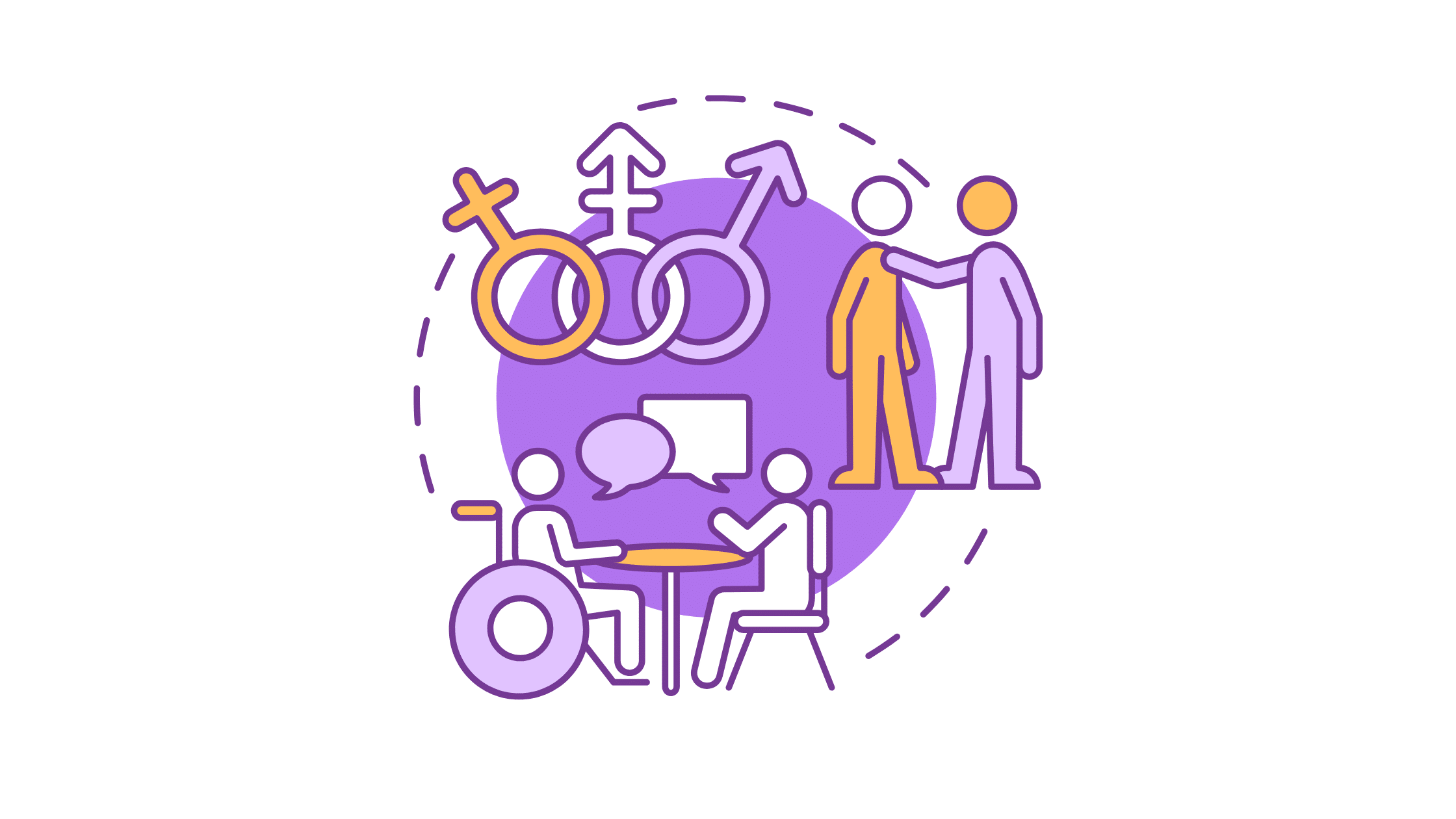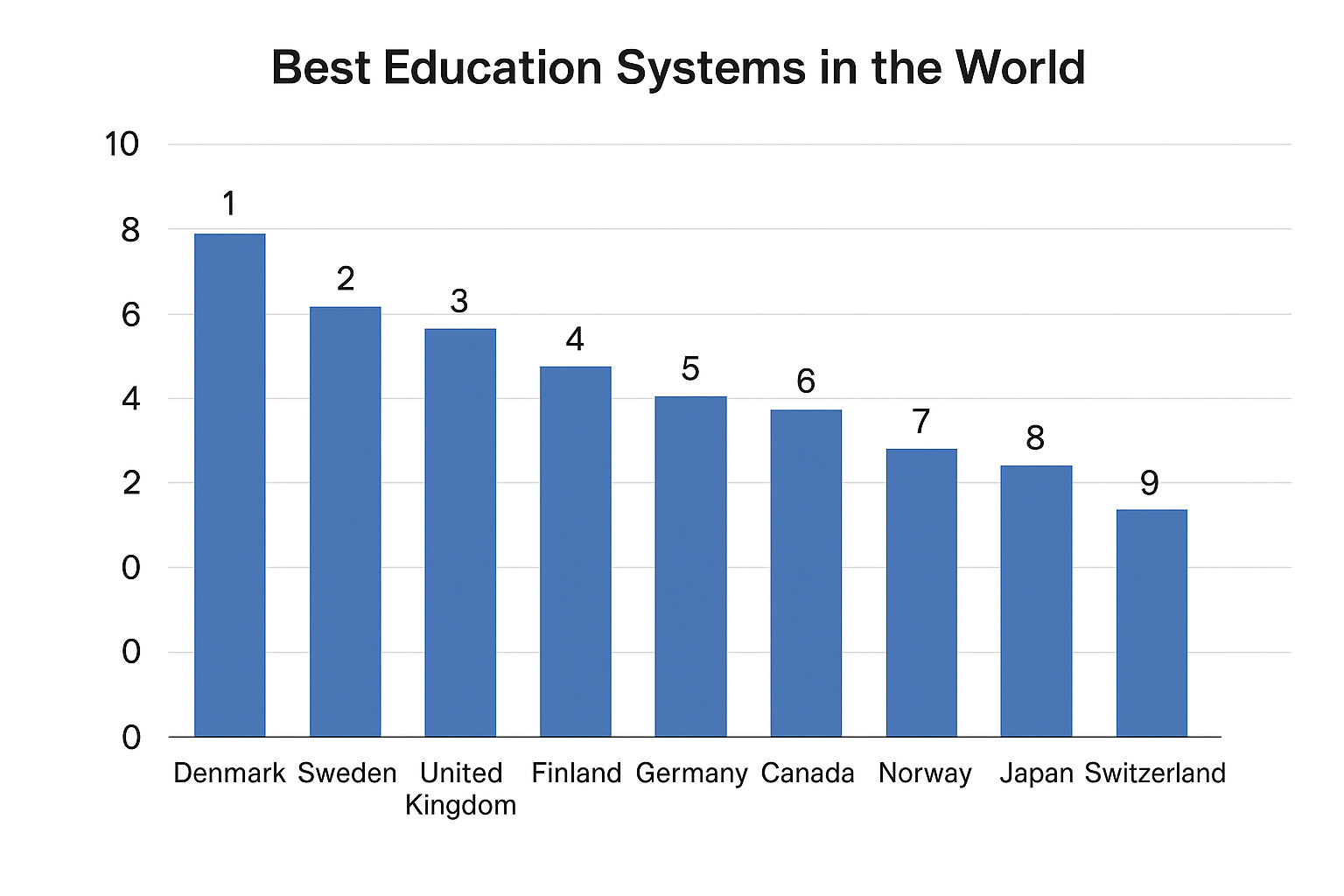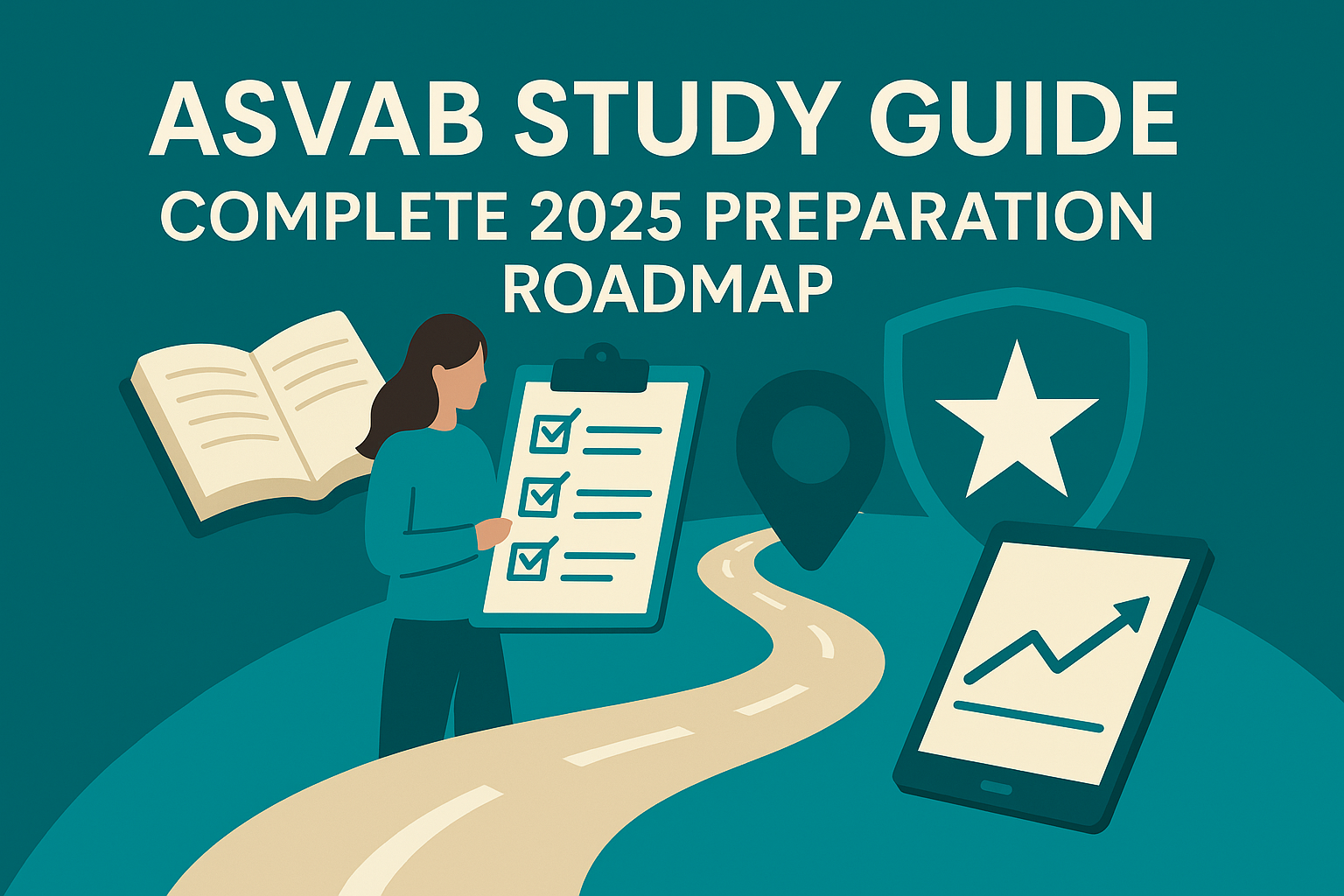
ASVAB Study Guide: Complete 2026 Preparation Roadmap
Introduction
If you’re considering a career in the U.S. military, the ASVAB (Armed Services Vocational Aptitude Battery) is one of the most important tests you’ll ever take. Think of it as the gateway to your future in the Armed Forces—it doesn’t just decide if you can enlist, it also plays a big role in determining what roles, specialties, and career paths are open to you.
So, what exactly is the ASVAB?The ASVAB is a multiple-choice exam designed to measure your knowledge and skills in areas like math, science, vocabulary, reading comprehension, and mechanics. It’s not just an academic test—it’s tailored to match your strengths with the right military occupational specialties (MOS in the Army/Marines, AFSC in the Air Force, ratings in the Navy, and so on).
Why does this matter? Because your ASVAB score, especially your AFQT (Armed Forces Qualification Test) percentile score, determines both eligibility for enlistment and which specific jobs you can qualify for. For example, a higher score can open doors to highly technical fields like aviation, cybersecurity, or engineering, while a lower score may limit your options to general enlistment roles. In short, the better you score, the more choices and career opportunities you’ll have.
That’s why preparing for the ASVAB isn’t optional—it’s essential. And that’s where this guide comes in.
👉 In this comprehensive ASVAB study guide, we’ll walk you through:
- The structure and scoring of the test.
- Effective study strategies and resources.
- Common mistakes to avoid.
- Real success stories from test-takers.
- A robust FAQ section to answer your most pressing questions.
Whether you’re aiming for a competitive job specialty or just want to make sure you pass with confidence, this guide will give you the tools, strategies, and motivation you need to ace the ASVAB and launch your military career.
What is the ASVAB?
The ASVAB (Armed Services Vocational Aptitude Battery) is a standardized test used by the U.S. military to assess a candidate’s skills and potential for success in various military careers. It’s more than just a pass/fail exam—it’s designed to match your aptitudes and strengths with military occupational specialties (MOS/AFSC/ratings), helping both you and the military find the best fit.
History & Purpose of the ASVAB
The ASVAB was first introduced in 1968 as a way to standardize the enlistment process across all branches of the U.S. Armed Forces. Before its creation, recruitment relied heavily on individual evaluations that could vary widely in fairness and consistency. Today, the ASVAB serves two key purposes:
- Assessing candidate readiness: Evaluates general and technical knowledge to ensure recruits can handle military training.
- Career placement: Helps determine which military jobs or specialties a recruit is best suited for based on their strengths.
How It’s Structured
The ASVAB consists of multiple subtests, each focusing on a different area of knowledge and skills. These include:
- Arithmetic Reasoning (AR): Solving word problems using basic math.
- Word Knowledge (WK): Understanding vocabulary and synonyms.
- Paragraph Comprehension (PC): Reading and understanding passages.
- Mathematics Knowledge (MK): Algebra, geometry, and math problem-solving.
- General Science (GS): Basic principles of biology, chemistry, earth science, and physics.
- Electronics Information (EI): Fundamentals of electrical circuits and devices.
- Auto & Shop Information (AS): Knowledge of tools, machinery, and automotive systems.
- Mechanical Comprehension (MC): Principles of mechanics, motion, and force.
- Assembling Objects (AO): Spatial and visual reasoning skills.
These subtests combine to form both the AFQT score and additional line scores used for job qualification in the military.
Difference Between ASVAB and AFQT Score
- ASVAB: The full set of subtests covering a broad range of skills. Your scores determine which MOS/AFSC/rating you qualify for.
- AFQT (Armed Forces Qualification Test): A subset of the ASVAB, calculated from Arithmetic Reasoning, Mathematics Knowledge, Word Knowledge, and Paragraph Comprehension. The AFQT score is reported as a percentile (0–99) and determines eligibility for enlistment.
Who Needs to Take the ASVAB?
- Enlistees: Anyone seeking to join the Army, Navy, Air Force, Marines, Coast Guard, or Space Force must take the ASVAB.
- High School & College Students: The ASVAB Career Exploration Program offers testing to help students identify strengths, potential careers, and vocational paths—even if they don’t plan to enlist immediately.
- Career Planning: Adults considering a military career or exploring technical skills may also take the ASVAB to assess aptitude and identify suitable specialties.
💡 Tip Box: “Whether you’re a student exploring options or a recruit aiming for a specialized job, understanding your ASVAB scores is the first step toward a successful military career.”
ASVAB Test Format & Sections
The ASVAB is designed to evaluate a wide range of skills, from basic math and science to mechanical understanding and spatial reasoning. Understanding the test format and each section is key to creating an effective study plan.
General Science (GS)
- Covers biology, chemistry, physics, and earth science basics.
- Tests your ability to understand scientific concepts and apply them to everyday problems.
- Focus areas: human body, ecosystems, simple physics, chemical reactions, and astronomy.
Arithmetic Reasoning (AR)
- Measures your ability to solve word problems using basic arithmetic.
- Emphasizes problem-solving skills rather than advanced math.
- Tips: Practice fractions, percentages, ratios, and basic algebraic reasoning.
Word Knowledge (WK)
- Evaluates your vocabulary, synonyms, and understanding of word meanings.
- Key for communicating effectively and understanding written instructions.
- Study tips: Flashcards, reading comprehension, and vocabulary apps.
Paragraph Comprehension (PC)
- Tests your ability to read, understand, and interpret passages.
- Requires identifying main ideas, details, and inferences.
- Strategy: Practice reading passages quickly and answering questions efficiently.
Mathematics Knowledge (MK)
- Focuses on algebra, geometry, and basic math principles.
- Covers equations, inequalities, functions, and geometric shapes.
- Tip: Review formulas and practice problem-solving under time constraints.
Electronics Information (EI)
- Measures knowledge of electrical circuits, devices, and electronic systems.
- Covers concepts like voltage, current, resistance, and basic electronics components.
Auto & Shop Information (AS)
- Tests your understanding of automotive mechanics, tools, and shop practices.
- Questions include car engines, hand and power tools, and basic maintenance knowledge.
Mechanical Comprehension (MC)
- Evaluates physics and mechanical reasoning skills.
- Topics include levers, pulleys, gears, force, and motion principles.
- Helpful for technical jobs in the military.
Assembling Objects (AO)
- Measures spatial reasoning and visualizing objects in three dimensions.
- Useful for jobs requiring mechanical assembly or understanding complex diagrams.
Format Differences: CAT-ASVAB vs. Paper-and-Pencil ASVAB
- CAT-ASVAB (Computer Adaptive Test):
- Paper-and-Pencil (P&P) ASVAB:
| Feature | CAT-ASVAB | P&P ASVAB |
|---|---|---|
| Adaptive | ✅ | ❌ |
| Time per section | Variable | Fixed |
| Question count | 100–145 | 225 |
| Retake ability | Limited | Moderate |
| Ideal for | Quick test-takers | Step-by-step learners |
💡 Tip Box: “Familiarize yourself with both formats to avoid surprises on test day — practice tests in your chosen format help boost confidence.”
ASVAB Scoring Explained
Understanding how the ASVAB is scored is crucial for planning your study strategy and knowing which military jobs you can qualify for. There are two main types of scores: AFQT scores and line/composite scores.
AFQT Score Breakdown
The AFQT (Armed Forces Qualification Test) score is a percentile ranking that compares your performance to a nationally representative sample of test-takers. It is calculated using four key ASVAB subtests:
- Arithmetic Reasoning (AR)
- Mathematics Knowledge (MK)
- Word Knowledge (WK)
- Paragraph Comprehension (PC)
AFQT scores range from 0 to 99, representing the percentage of people you scored higher than. For example, an AFQT score of 70 means you scored better than 70% of the reference group.
AFQT Score Categories (for enlistment eligibility):
- Category I–IIIA: Highest percentile scores (qualified for most jobs)
- Category IIIB–IV: Moderate percentile scores (limited job options, may require waivers)
- Category V: Lowest percentile (generally ineligible for enlistment)
Line Scores & Composite Scores
While the AFQT determines eligibility, line scores (also called composite scores) determine job qualifications in each branch of the military. Line scores are calculated using different combinations of ASVAB subtests depending on the desired MOS/AFSC/rating.
For example:
- Mechanical & Technical Jobs: Often use MC, EI, and AS scores.
- Clerical or Administrative Jobs: Emphasize AR, MK, WK, and PC.
- Combat or Operational Roles: May rely more on AR, MK, and GS scores.
What is a “Good” Score?
Minimum AFQT requirements vary by branch:
| Branch | Minimum AFQT Score |
|---|---|
| Army | 31 |
| Navy | 35 |
| Air Force | 36 |
| Marines | 32 |
| Coast Guard | 40 |
| Space Force | 36 |
Tip: Higher scores not only increase your chances of enlistment but also open up more specialized and technical job opportunities.
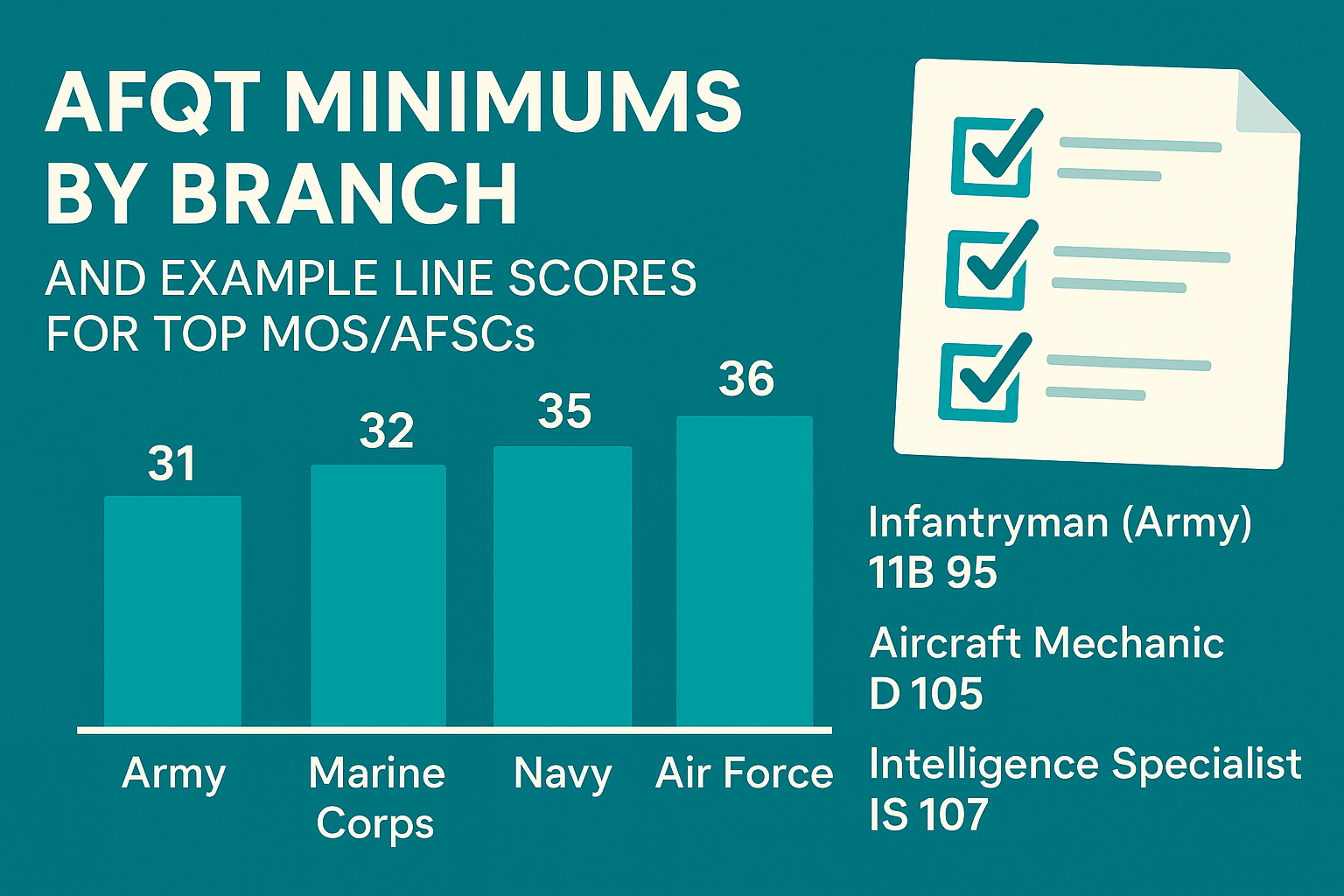
“AFQT focuses on AR, MK, WK, and PC — master these first to maximize both eligibility and career options.”
How to Study for the ASVAB Effectively
Preparing for the ASVAB requires more than just memorization—it’s about structured planning, targeted practice, and consistent review. Here’s a step-by-step guide to studying efficiently and maximizing your scores.
Create a Study Plan
- Set daily and weekly goals for each ASVAB subtest.
- Break down topics into manageable chunks (e.g., 30–45 minutes per subject per session).
- Schedule regular review sessions to reinforce what you’ve learned.
- Include practice tests periodically to measure progress and adjust your plan.
Use Official ASVAB Study Guides & Practice Tests
- Official guides from DoD or branch-specific resources provide accurate question formats.
- Practice tests familiarize you with question types, timing, and difficulty levels.
- Track your scores on each subtest to identify areas needing improvement.
Leverage Flashcards & Apps for Quick Review
- Use flashcards for vocabulary, formulas, and key science concepts.
- Mobile apps allow for on-the-go practice, perfect for short study bursts.
- Gamified apps can make review interactive and engaging.
Focus on Weak Areas vs. Strengths
- Identify subtests where your scores are lowest and prioritize those first.
- Balance review time so you maintain strengths while improving weak areas.
- Example: If WK and AR are low, dedicate extra time to reading comprehension and math word problems.
Join Study Groups (Reddit, Quora, Discord)
- Online communities provide peer support, tips, and shared resources.
- Discuss tricky questions or concepts to gain different perspectives.
- Engage in mock quizzes and challenge sessions with peers to simulate test conditions.
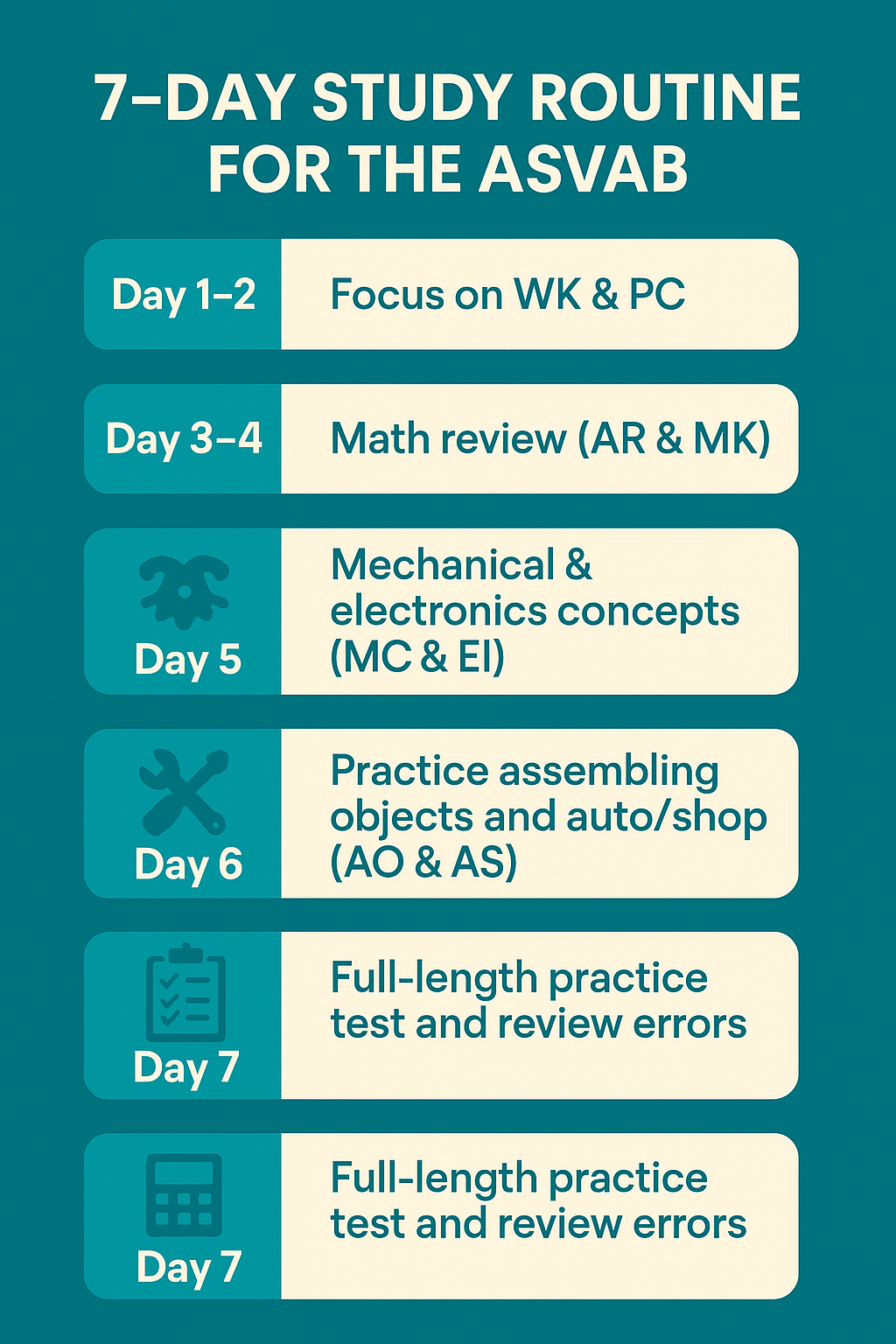
📌 Tip Box: “Consistency beats cramming—short, focused sessions every day yield better results than a single marathon study session.”
Test-Taking Strategies for ASVAB Success
Even the most well-prepared candidates can struggle if they don’t approach the ASVAB strategically. Here are essential test-taking strategies to maximize your score and stay confident on exam day.
Time Management Tips for Each Section
- Allocate time based on question count and difficulty for each subtest.
- Don’t spend too long on a single question—move on and return if time permits.
- Use practice tests to familiarize yourself with pacing, so you can complete all sections comfortably.
Guessing vs. Skipping: What Works Best
- CAT-ASVAB: Skipped questions often cannot be returned to, so guess wisely.
- P&P ASVAB: You can skip and return, but avoid leaving blanks, as unanswered questions are usually counted wrong.
- Use educated guesses: eliminate obviously wrong options to improve your chances.
Eliminating Wrong Answers Quickly
- Read each question carefully, noting keywords and qualifiers (e.g., “most likely,” “except”).
- Rule out implausible answers first to narrow choices.
- Focus on process of elimination rather than relying solely on recall.
Handling Test Anxiety & Staying Calm
- Practice deep breathing or visualization techniques before the exam.
- Positive self-talk helps maintain confidence: “I’ve studied, I know this material.”
- Familiarity with practice tests reduces surprises, lowering stress.
Practice with Timed Mock Tests
- Simulate real test conditions by timing yourself on each subtest.
- Identify patterns in mistakes to refine study strategies.
- Gradually increase difficulty with mixed-topic practice tests to build endurance.
💡 Pull-out Tip: “Treat each practice test like the real exam—timing, environment, and focus matter just as much as knowledge.”
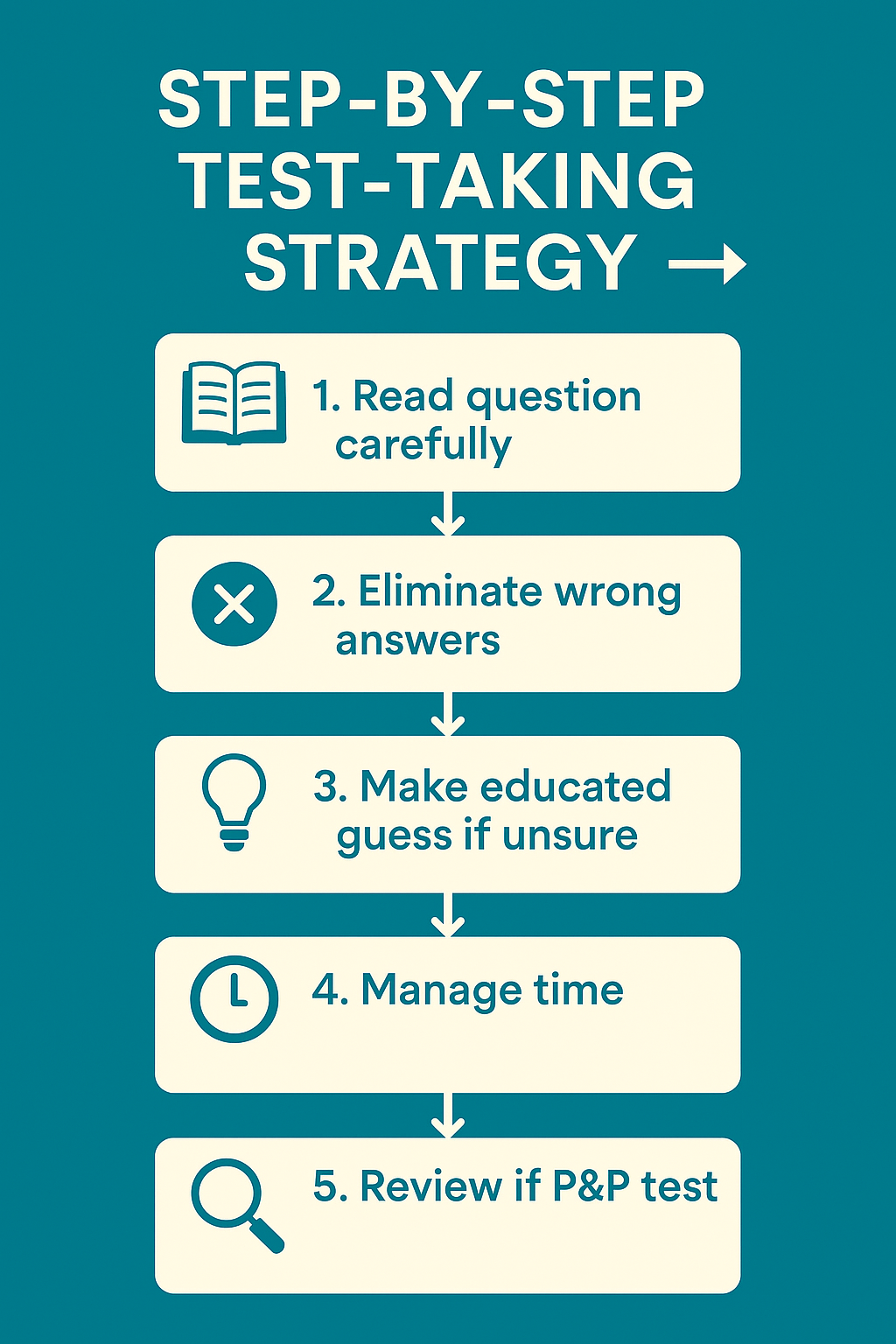
Resources & Study Materials
A strong preparation strategy requires the right resources. Using a mix of official guides, prep books, online tools, and apps ensures comprehensive coverage of all ASVAB sections.
Official DoD Practice Tests
- Provided by the Department of Defense, these tests reflect the actual format and question types.
- Ideal for benchmarking your scores and understanding the test structure.
- Free and accessible online through official military websites.
Best ASVAB Prep Books
- Kaplan ASVAB Prep: Detailed strategies, practice tests, and skill-building exercises.
- Peterson’s ASVAB Prep: Includes subject-specific practice, explanations, and test-taking tips.
- Barron’s ASVAB: Focused on practice questions with step-by-step solutions.
- Books often include diagnostic tests to identify strengths and weaknesses.
Online Resources
- Mometrix: Offers comprehensive study guides, practice questions, and tutorials.
- ASVABTutor.com: Interactive lessons and quizzes for each subtest.
- Union Test Prep: Free ASVAB practice tests and study materials with progress tracking.
- Online platforms often include explanations for wrong answers, which help reinforce learning.
Mobile Apps for On-the-Go Practice
- Apps like ASVAB Practice Test, Pocket Prep, and Varsity Tutors ASVAB Prep provide quick quizzes, flashcards, and progress tracking.
- Useful for commuting, breaks, or short study sessions.
- Many apps allow you to customize focus areas, targeting weak subtests.
💡 Tip Box: “Combine official resources with prep books and apps for a balanced, flexible study plan. Practice in multiple formats to build confidence for the real test.”
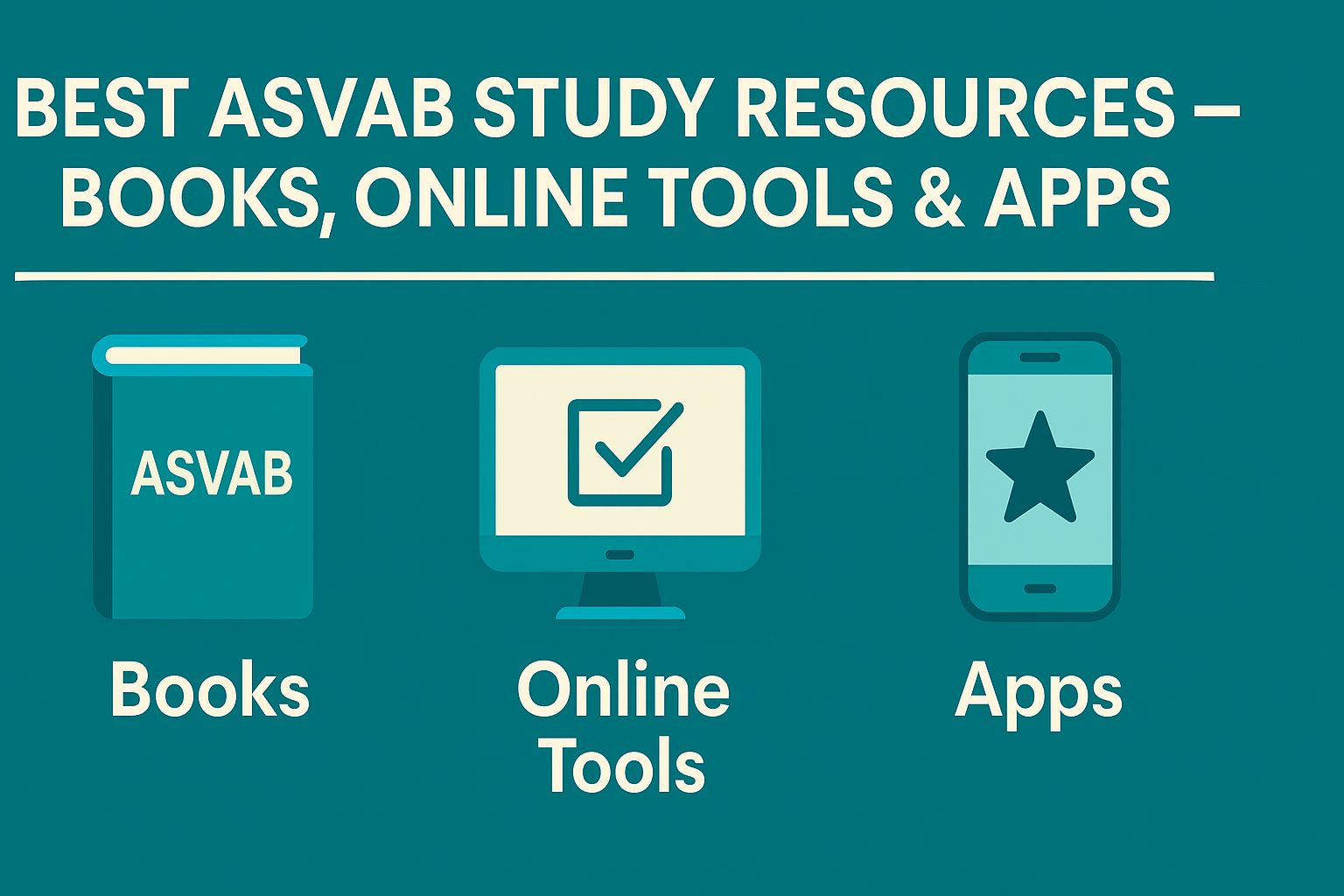
Common Mistakes to Avoid
Preparing for the ASVAB effectively requires focus and strategy. Avoid these pitfalls that can lower your score:
- Studying without a plan: Random practice without goals wastes time and increases anxiety.
- Ignoring math basics: Weakness in arithmetic and algebra can drastically affect both AFQT and line scores.
- Over-relying on apps/wearables (non-official): While useful for practice, unofficial tools may not reflect real test content.
- Last-minute cramming: Cramming can reduce retention and increase stress; consistent daily study is far more effective.
Real-Life Success Stories
Learning from others’ experiences can provide motivation and practical tips:
- Reddit-style testimonial: “I raised my AFQT from 45 to 75 in just 2 months by focusing on AR, MK, WK, and PC daily.”
- Case Study: A student struggling with mechanical comprehension improved line scores through a combination of targeted practice and online tutoring, qualifying for a highly specialized MOS in the Army.
Alternatives & Next Steps if You Don’t Pass
Failing the ASVAB isn’t the end—strategic retakes and supplemental study can help:
- Retesting policies & waiting periods: Most branches allow retakes, usually after 30 days for the first retest and longer for subsequent attempts.
- Working with a recruiter: Recruiters can provide guidance on which subtests to focus on and recommend study resources.
- Supplemental study programs: Tutoring, online courses, and prep classes can help strengthen weak areas and improve overall scores.
The Future of ASVAB Prep
ASVAB preparation is evolving with technology and AI, offering more personalized and engaging study methods:
- AI-driven tutoring platforms: Tailor lessons based on your performance, pinpointing weak areas.
- Adaptive learning apps: Adjust difficulty dynamically and provide real-time feedback.
- VR/AR for mechanics & electronics practice: Immersive simulations for hands-on understanding of technical concepts
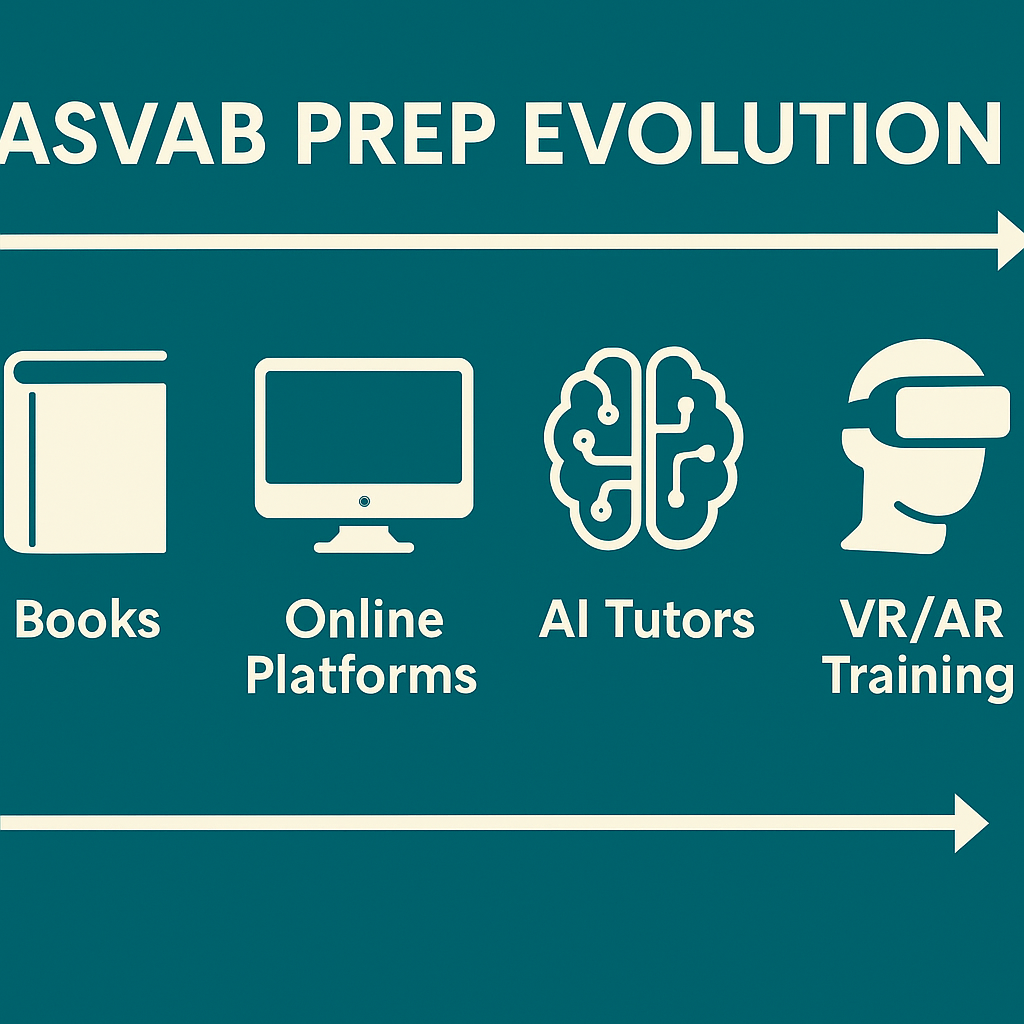
💡 Tip Box: “Embrace new study technologies but always combine them with official practice tests and guides to ensure comprehensive preparation.”
Final Thoughts — Should You Try an ASVAB Study Guide?
Using a well-structured ASVAB study guide can make a significant difference in your preparation and eventual performance. Here’s why it’s worth your time:
- Structured Learning: Study guides provide an organized approach, covering all ASVAB subtests without leaving gaps in your knowledge.
- Targeted Practice: Identify strengths and weaknesses, allowing you to focus on areas that need improvement, rather than wasting time on topics you already know.
- Career Boost: Higher scores expand your eligibility for specialized jobs, scholarships, and advanced training opportunities in the military.
Consistency is key—daily, focused study sessions outperform last-minute cramming and build confidence for test day.
◆Treat the ASVAB not just as a test, but as the first stepping stone in your military journey. With preparation, determination, and the right resources, you can maximize your potential and open doors to the career you’ve been aiming for.
📌 Tip Box: “Start early, stick to your plan, and use your study guide as a roadmap—every question practiced brings you closer to success.”
FAQs
What is the best ASVAB study guide for beginners?
Official DoD guides, Kaplan ASVAB Prep, Peterson’s, and Barron’s are top choices for beginners due to comprehensive coverage and practice tests.
How many hours should I study for the ASVAB?
It depends on your starting level, but 2–3 hours daily for 4–6 weeks is recommended for consistent improvement.
Is the ASVAB hard to pass?
It varies by individual. With structured preparation and practice, most test-takers can meet minimum AFQT requirements.
What score do I need for the Army, Navy, Air Force, Marines, Coast Guard, and Space Force?
| Branch | Minimum AFQT Score |
|---|---|
| Army | 31 |
| Navy | 35 |
| Air Force | 36 |
| Marines | 32 |
| Coast Guard | 40 |
| Space Force | 36 |
Can I study for the ASVAB in 2 weeks?
Yes, with an intensive, focused plan, especially if you concentrate on AR, MK, WK, and PC subtests that impact the AFQT score.
What’s the fastest way to raise my AFQT score?
- Focus on AR, MK, WK, and PC first.
- Take timed practice tests to identify weak areas.
- Review mistakes thoroughly and retest frequently in practice.
Are free ASVAB practice tests accurate?
Many provide a general sense of content, but official DoD and trusted prep books are more accurate in reflecting real test difficulty.
How often can I retake the ASVAB?
- First retest: after 30 days
- Second retest: after another 30 days
- Third and subsequent retests: after 6 months (policies vary by branch)
Do ASVAB apps really help?
Yes, apps like Pocket Prep and Varsity Tutors can reinforce concepts, provide flashcards, and track progress, but should be paired with official study guides.
Can I use GED + ASVAB to join the military?
Yes, GED holders can enlist, but they may need higher AFQT scores than high school graduates.
Additional Common Questions
- What is the best way to study for the ASVAB? Structured study plan + official practice tests + targeted review.
- Is 27 a bad ASVAB score? Below average; may limit enlistment eligibility.
- Is 70 a bad ASVAB score? Excellent; opens most job options.
- Is there a free ASVAB study guide? Yes, the DoD provides official free resources online.
- What is a passing ASVAB score? Depends on branch, typically AFQT ≥ 31 for Army, 36 for Air Force, etc.
- Does Khan Academy have ASVAB prep? Not officially, but their math and science tutorials can help for AR, MK, and GS.
- What happens if I fail the ASVAB? You can retest after waiting periods and work on weak areas.
- How expensive is the ASVAB? The test is free, but prep books and courses vary in cost ($20–$60+).
💡 Tip Box: “Use a combination of official guides, practice tests, apps, and study groups to cover all ASVAB subtests efficiently.”

